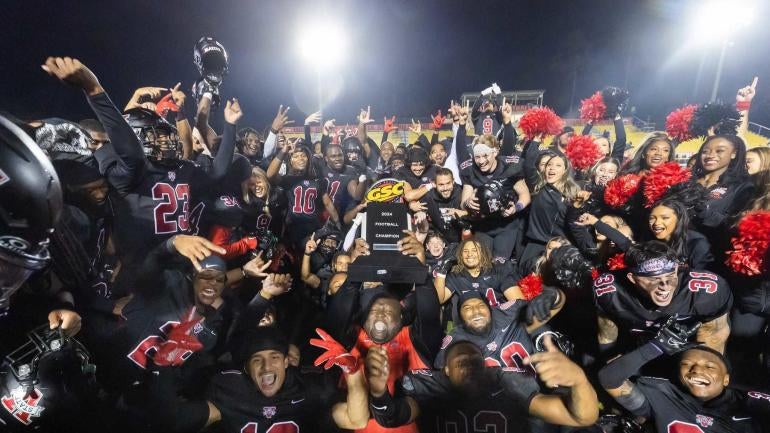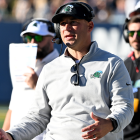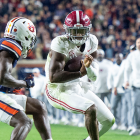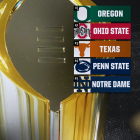
When Tremaine Jackson interviewed at Valdosta State three years ago, the school president asked him a simple but pointed question: What can you bring here to beat West Florida?
West Florida was the 2019 D-II national champions and had emerged as the annual hurdle of the Gulf South Conference. They're a well-funded program that operates like a Division-I operation. Jackson gave the only answer he had.
"If you hire me, you'll have the one thing West Florida won't, "Jackson said. "That's me."
"It's one of those things when you say it, you go, 'Dang, I probably blew it,'" Jackson told CBS Sports with a laugh. "But I was dead serious. I just know how to get things done, man."
He wasn't lying.
Valdosta State enters the Division II playoffs this week as the No. 1 team and with a 10-0 record. It took a bit for Jackson to get the Blazers where he wanted, but they've emerged as a powerhouse in Year 3 with an average scoring margin of 34 points per game. West Florida? The Argonauts lost to Valdosta State, 28-7, in their regular season finale.
That success is a big reason why Jackson's emerged as a popular name in FCS coaching searches and even a few on the FBS level, where several search firms and schools have had conversations with him this cycle.
Not that it always went that well for Jackson in his first year taking over from the successful Gary Goff, who left for an FCS job at McNeese State.
Jackson, who previously coached Colorado Mesa, remembers showing up on campus following the 2021 season. He picked Valdosta State because he felt like it's a place where he could compete for championships. Then he dove into the books and came away with an uneasy feeling that there wasn't close to enough in the cupboard.
Division II programs are allowed 36 full scholarships. Valdosta State, which had just played for a national championship, had the funding for 17 after budget cuts. He felt he could not totally rely on committing fully to a transfer portal turnover because area high school coaches were getting annoyed he wasn't recruiting their players.
Things went poorly. The Blazers went 5-7 in Jackson's debut a year after winning 12 games.
"I wasn't getting anywhere," Jackson said. "It really made me think about whether this is what I want to do. I had a chance to leave and be a position coach. Then the competitor in me came out."
The idea that Jackson felt uncertain of his path feels laughable. His confidence, his booming voice, jump through the telephone.
Jackson hit the big time in 2019. He nabbed a FBS on-field job as the d-line coach at Texas State. He'd worked in lower-division football for 13 years to get there, calling defenses at Texas Southern, Sioux Falls and Abilene Christian. He made good money in San Marcos. He lived in his home state.
But he always wanted to be a head coach. So, he applied online -- yes, he literally sent in an application -- to take over at Colorado Mesa, a small D-II school in Grand Junction, Colorado.
Why would he leave a cushy FBS job for a D-II program at a place where he had no ties? It's what he's always felt the need to do, a desire to lead young people sparked early by his mother and grandmother placing him in football at age four while growing up in Houston. They wanted to keep him out of trouble. Jackson, who grew up with a father, found father-figures in his coaches and ultimately life lessons he feels the need to share.
"I feel like coaching is a calling for me," Jackson said. "When you have this conviction in your soul that you need to be in charge of a whole program, I didn't care what level.
"Not having a father, wondering what that was like, being at events where people's dads were there and I had nobody there, that always made me want to stand in the gap because (my coaches) stood in the gap for me."
So, Jackson went to work after Year 1. A booster gave a $350,000 donation that funded many more scholarships. Jackson turned the roster over completely. He brought in nearly 140 new players between the fall of 2022 and this season.
Culture problems with transfers? Not at Valdosta State. Jackson puts his team through what he calls D.O.G training (discipline, obedience and grit), an offseason regimen that caused some to quit but brought everyone else together.
Two years later, Valdosta State is again among the powers of Division-II football.
The Blazers still don't have a full scholarship allotment at 24.5, but a program once known for the Air Raid under Hal Mumme is now also a defensive powerhouse, allowing just nine points per game going into a Round of 16 matchup with Miles College.
A playoff run is next for Jackson. After that? His vision of helping players won't always reside in Division II. Long term, Jackson hopes to thrive on the highest level.
"The Division I level is where people take notice," Jackson said. "The inner competitor in me wants to be on that level. But ultimately, I want to be on the highest level where we can inspire the hearts and minds of young people."
















